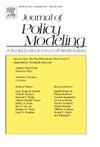Overeducation under different macroeconomic conditions: How Spanish university graduates fit in the labor market?
IF 3.1
2区 经济学
Q1 ECONOMICS
引用次数: 0
Abstract
This paper analyzes a relevant issue for education and labor policymakers, overeducation in the early careers of university graduates. Using Spanish data, we investigate the role played by the business cycle and field of study and their interaction in shaping both the incidence and persistence of overeducation. We also analyze the relevance of specific types of knowledge and skills as driving factors in reducing overeducation risk. Our data come from the Survey on the Labor Insertion of University Graduates (EILU) conducted by the Spanish National Statistics Institute in 2014 and 2019. The survey collects rich information on cohorts that graduated in 2019 and 2014, during the Great Recession and the subsequent economic recovery, respectively. Our results show, first, the relevance of the economic scenario when graduates enter the labor market. Graduation during a recession increases overeducation risk and persistence. Second, a clear heterogeneous pattern is observed across fields of study, with health sciences graduates displaying better performance in terms of both overeducation incidence and persistence and less impact of the business cycle. Third, we find evidence that some transversal skills can help to reduce overeducation risk in the absence of specific knowledge required for the job, thus indicating some kind of compensatory role. Our findings have important policy implications. Overeducation, and more importantly overeducation persistence, imply a non-neglectable misallocation of resources, with serious consequences not only for the affected individuals but for the society as a whole. Therefore, policymakers need to address this issue in the design of education and labor market policies, seeking to ensure that the competencies acquired at university provide graduates with a better fit in the labor market.
不同宏观经济条件下的过度教育:西班牙大学毕业生如何适应劳动力市场?
本文分析了一个与教育和劳动政策制定者相关的问题,即大学毕业生早期职业生涯中的过度教育。利用西班牙的数据,我们调查了商业周期和研究领域在塑造过度教育的发生率和持久性方面所起的作用。我们还分析了特定类型的知识和技能作为降低过度教育风险的驱动因素的相关性。我们的数据来自西班牙国家统计局在2014年和2019年进行的大学毕业生劳动力插入调查(EILU)。该调查收集了2019年和2014年毕业的毕业生的丰富信息,分别是在大衰退期间和随后的经济复苏期间。我们的研究结果表明,首先,毕业生进入劳动力市场时的经济情景的相关性。在经济衰退期间毕业增加了过度教育的风险和持久性。其次,在研究领域中观察到明显的异质性模式,健康科学毕业生在过度教育发生率和持久性方面表现更好,并且受商业周期的影响较小。第三,我们发现有证据表明,在缺乏工作所需的特定知识的情况下,一些横向技能可以帮助减少过度教育的风险,从而表明某种补偿作用。我们的研究结果具有重要的政策意义。过度教育,更重要的是持续过度教育,意味着一种不可忽视的资源错配,不仅对受影响的个人,而且对整个社会都有严重后果。因此,政策制定者需要在设计教育和劳动力市场政策时解决这个问题,寻求确保在大学获得的能力为毕业生提供更好的劳动力市场。
本文章由计算机程序翻译,如有差异,请以英文原文为准。
求助全文
约1分钟内获得全文
求助全文
来源期刊

Journal of Policy Modeling
ECONOMICS-
CiteScore
6.20
自引率
11.40%
发文量
76
期刊介绍:
The Journal of Policy Modeling is published by Elsevier for the Society for Policy Modeling to provide a forum for analysis and debate concerning international policy issues. The journal addresses questions of critical import to the world community as a whole, and it focuses upon the economic, social, and political interdependencies between national and regional systems. This implies concern with international policies for the promotion of a better life for all human beings and, therefore, concentrates on improved methodological underpinnings for dealing with these problems.
 求助内容:
求助内容: 应助结果提醒方式:
应助结果提醒方式:


